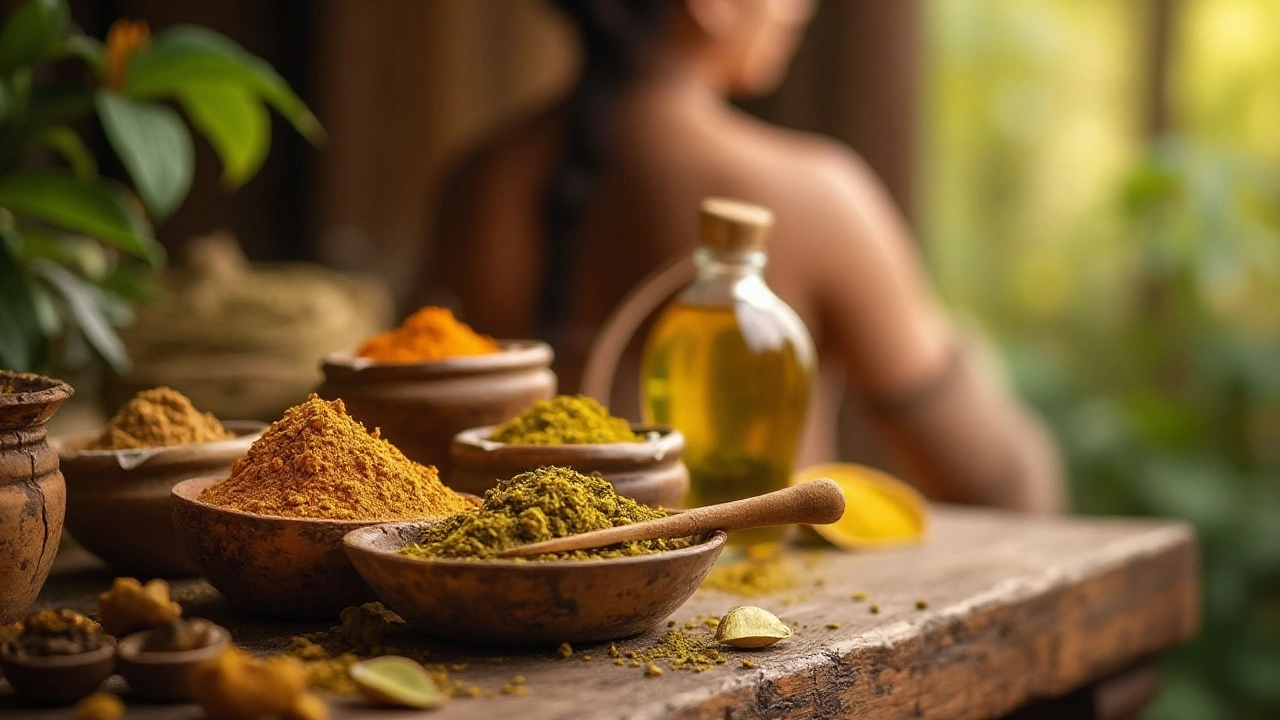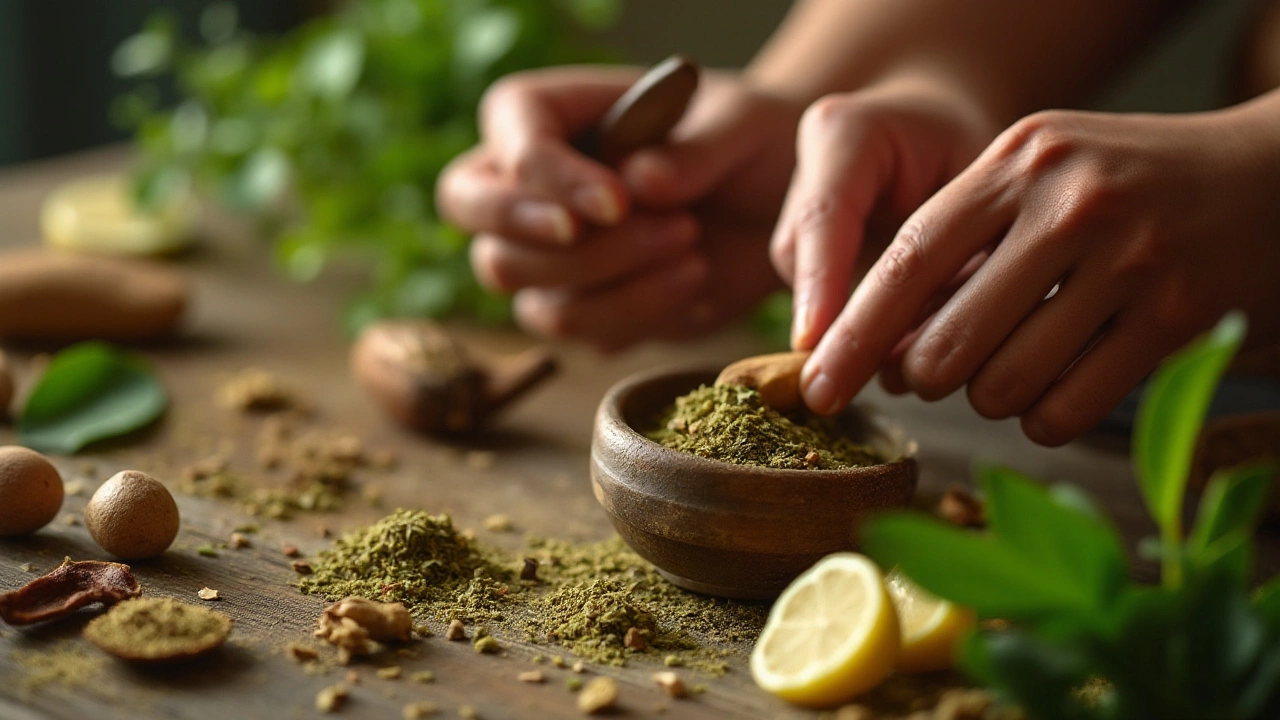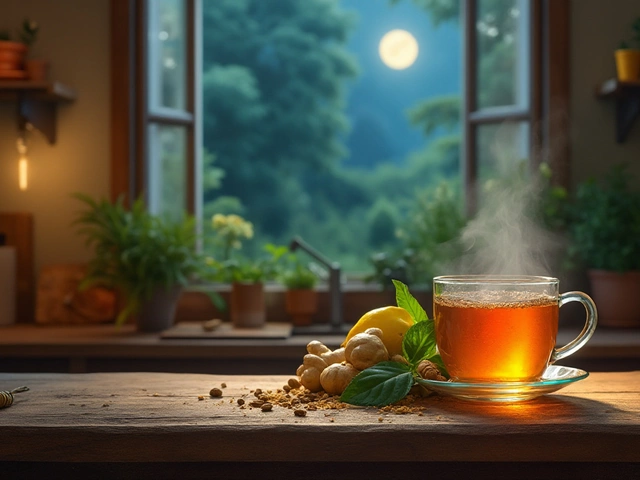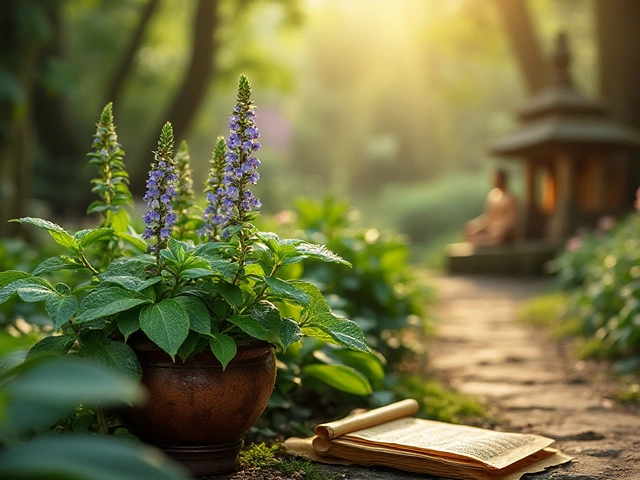In a world where hair care products line the shelves, some of the best solutions may be found in nature's bounty. Ayurvedic medicine, with its ancient roots and vast knowledge of herbs, offers insights into how we can nurture our hair naturally.
Amidst the plethora of herbal remedies, one stands out as the royalty of hair-enhancing plants. Known for its ability to fortify and rejuvenate, this herb has been cherished for its multifaceted benefits. By delving into its secrets, anyone can discover the potential for healthier, stronger hair.
- The Ancient Wisdom of Ayurveda
- Key Herb and Its Benefits
- How to Incorporate the Herb into Hair Care
- Other Noteworthy Ayurvedic Herbs
The Ancient Wisdom of Ayurveda
Ayurveda, an ancient system of medicine native to India, embodies a philosophy that emphasizes balance between the mind, body, and spirit. This holistic approach has transcended millennia, quietly influencing health practices in many parts of the world. Its origins most likely span over 5,000 years, offering a structured system for understanding the profound interplay between nature and human health. Within ayurveda's comprehensive toolkit, plants and herbs play a pivotal role, revered for their ability to align the body with its natural rhythms. These remedies, handed down through generations, have been intricately woven into the fabric of daily life in India, where nature and health meet in harmony.
Utilizing herbs for hair health is deeply rooted in ayurvedic traditions, where natural components are preferred for their minimal side effects and holistic benefits. From amla, known for promoting hair growth, to neem for its antimicrobial properties, ayurveda offers a multitude of options. Each herb is chosen not just for its immediate benefits but for its long-term effects on vitality and wellness. Achieving balance is not merely a medical goal in ayurveda; it is a way of life, where beauty and health are the fruits of a balanced existence.
"Ayurveda teaches us to cherish our innate nature - 'to love and honor who we are', not as what people think or tell us, 'who we should be'," proclaims Dr. David Frawley, a respected author and teacher in the field.
At its core, ayurveda recognizes the unique constitution of each person, expressed in the doshas known as Vata, Pitta, and Kapha. This elemental philosophy dictates personalized approaches, ensuring that treatments are tailored to individual needs. Whether it's soothing a fiery Pitta with cooling herbs or grounding a flighty Vata with earthier plants, the approach is integrative and comprehensive. The gentle lull of herbal-infused oil massages is designed not just to cleanse the hair but to revitalize the soul. This bespoke approach is why people around the globe are turning back to these ancient wisdoms, seeking natural harmony in an increasingly chemical world.
In recent years, ayurvedic practices have gained attention not only in traditional settings but also in the scientific community. Empirical studies into the properties of various herbs support claims made by ayurveda centuries ago. Modern technologies and methodologies have revealed compounds in these plants that possess the advertised bioactivity, lending new credibility and excitement. This confluence of age-old wisdom and contemporary science offers promise and hope for those seeking natural remedies amidst modern maladies. Researchers continue to explore how these ancient practices resonate in our modern understanding of health, revealing the perennial nature of ayurveda's truths.
The lure of ayurveda lies not just in its promise of healing but in its gentle reminder of our connection to the earth. It beckons a return to simplicity, urging us to eschew unnecessary excess. In this way, ingredients like herbs for hair do more than enhance external beauty; they invite a deeper engagement with oneself and with nature. As the complexities of modern life grow, more individuals cherish the straightforward, natural approach offered by ayurvedic practices, integrating them into multifaceted lifestyles where tradition meets modernity. By doing so, the ancient wisdom of ayurveda perpetuates its legacy, promising balance, beauty, and health for generations to come.

Key Herb and Its Benefits
In the diverse landscape of ayurveda, there's one herb that stands unparalleled for hair health—Amla, also known as Indian Gooseberry. This age-old remedy, lauded across centuries, is revered for its potent nutrient profile and multifarious benefits. Particularly rich in vitamin C, Amla stands as a fortress of immune-boosting properties and is a powerhouse of antioxidants. It is this very richness that contributes to its acclaim in promoting hair health. The compelling effects it renders on hair include dramatic enhancements in strength, shine, and growth. Amla works its magic by nourishing the scalp, which is often the root of many hair-related woes. Regular applications or supplements can significantly mitigate hair thinning, dandruff, and premature graying, marking its superiority among other herbs.
A deeper look into the composition of Amla reveals that it's more than just a vitamin C reservoir. The fruit also boasts a healthy dose of tannins, enzymes, and minerals critical in promoting resilient hair. These components play pivotal roles individually and synergistically, ensuring the hair's integrity by restoring and fortifying hair roots. The success of Amla in hair treatment has been supported not just anecdotally but through various studies. Dr. Vaidya V. P. Singh mentioned in his research,
"Amla has been demonstrated to improve hair tensile strength, and its regular application results in silkier, shinier hair."Such endorsements have propelled Amla into a staple of modern hair care routines, not just within the vicinity of traditional users, but globally.
To harness the full benefits of this remarkable herb, it's crucial to incorporate it effectively into daily hair care rituals. A frequently adopted method is the preparation of an Amla oil infusion, a simple concoction yet a potent treatment. This involves immersing dried Amla pieces in a carrier oil, traditionally coconut or sesame oil, and allowing the infusion to rest until the oil absorbs all essential nutrients. The resultant oil, when applied and massaged into the scalp, stimulates improved blood circulation and strengthens hair follicles. Alternatively, Amla powder can be mixed into hair masks with yogurt or eggs, creating a nourishing paste that could be an ideal weekend ritual for its intensive conditioning properties.
However, one mustn't forget internal consumption as an effective method of reaping Amla's hair benefits. The fruit can be ingested raw, as juice, or incorporated into culinary practices, each offering a subtle variation in taste and benefit. Ayurveda emphasizes a holistic approach, suggesting that the synergy of topical and internal usage often yields transformative results in hair health. Anecdotal accounts supported by systematic observations find correlations between consistent Amla ingestion and marked improvements in hair vitality over time, solidifying its stance as the 'king' of hair-enhancing herbs.

How to Incorporate the Herb into Hair Care
Embracing the wonders of nature in your everyday life can be a transformative experience, especially in the realm of hair health. Integrating this powerful herb, often known for its unmatched ability to enhance hair’s vitality, doesn't require mastering intricate recipes or setting aside large chunks of your day. The beauty of ayurveda lies in its simplicity, making it easy for anyone to adopt these practices seamlessly into their routine.
Start by exploring the versatile forms in which this herb is available. From ready-made oils to homemade pastes, the options are abundant. The decision of which to use often depends on personal preference and the specific goal you're aiming for. If strengthening the hair shaft is your target, incorporating an oil form can be immensely beneficial. Here, the magic lies in a thorough scalp massage which not only nourishes but promotes blood circulation, bringing about a natural sheen to otherwise lackluster locks. Regular application—about once or twice a week, allows the rich vitamins and minerals in the herb to work their magic, slowly yet steadily transforming your hair.
"Nature does not hurry, yet everything is accomplished." – Lao Tzu.
If routine allows for a more involved practice, creating a paste by mixing the powdered form of the herb with water or even yogurt can serve as a fantastic hair mask. Such a mask provides targeted nourishment, repairing damages often caused by environmental stressors or styling routines. Leave the paste on the scalp for about 30 minutes before rinsing, giving ample time for nutrients to sink in. Incorporating such a ritual once in two weeks not only restores but maintains optimum hair health.
For those inclined towards convenience, the market abounds with shampoos and conditioners infused with this miraculous herb. These products ensure you're harnessing its benefits even in the simple act of washing your hair. Make sure to read the ingredients list diligently, opting for those products that list the herb as a core ingredient. This ensures effectiveness and guarantees that your hair care routine is aligned with the essence of ayurvedic wisdom.
Ultimately, weaving this ancient ayurvedic remedy into daily practices is less about rigid schedules and more about finding joy in small, nurturing rituals. Altering the ways we treat our hair not only brings visible changes but fosters a deeper connection with nature’s healing bounty. Each strand, restored to its former glory, speaks to centuries of wisdom passed down, inviting us to embrace a holistic way of living.

Other Noteworthy Ayurvedic Herbs
When we dive into the treasure trove of Ayurvedic wisdom, we're greeted by a wide array of herbs for hair that promise to nourish and rejuvenate. While there's a king herb that takes the spotlight, many others deserve acknowledgment for their beneficial properties on hair health. These time-tested remedies have been used across generations, blending seamlessly into various treatments that target different hair concerns. Each herb comes with its own unique set of benefits, speaking to the versatility and depth of Ayurvedic practices.
Amla, or Indian gooseberry, is one such remarkable herb. Known for its ability to enhance hair pigmentation and promote luscious locks, Amla is packed with essential fatty acids, vitamins, and antioxidants that work together to strengthen and condition the hair. Many swear by its efficacy, proving that sometimes the simplest ingredients yield the most potent results. Regular use of Amla can potentially reduce greying and nourishing the scalp, encouraging vibrant and healthy hair growth.
Then there's Brahmi, often hailed for its soothing properties that extend beyond stress relief to promote healthy hair. Brahmi oil is often gently massaged into the scalp, helping to reduce dandruff and excessive hair fall. Its calming effect is said to improve circulation in the scalp, ensuring that hair follicles get ample nutrients to thrive. With consistent use, Brahmi can lead to hair that feels softer, thicker, and more resilient. It's fascinating how this herb also enhances cognitive function while caring for your tresses.
Neem, known for its antiseptic qualities, takes a special place in hair care as well. Apart from cleansing the scalp and keeping dandruff at bay, Neem also helps tackle scalp infections. Its application in hair oils and shampoos is widespread, attesting to its efficacy and popularity in natural treatments. A gentle Neem rinse can effectively soothe an itchy scalp, making it a boon for those struggling with persistent scalp issues. If there's one herb that perfectly exemplifies the synergy between cleansing and nourishing, Neem stands as a worthy contender.
"The use of Ayurvedic herbs for hair care is a holistic approach that aligns with the body's natural processes," states Dr. Shiva, an Ayurvedic practitioner with over two decades of experience. "The plants we use infuse vitality not just to hair but to the entire system, reflecting an inside-out sort of beauty."
Hibiscus, with its vibrant red flowers, is more than just an ornamental plant. It might surprise many to learn that it contributes to revitalizing dull hair and adding extraordinary shine. Hibiscus paste can be applied directly to the scalp, helping to combat dryness and frizz. It's particularly favored for those with curly or wavy hair, serving as a natural conditioner. As you explore the world of Ayurvedic hair care, Hibiscus demonstrates how beauty and effectiveness can converge. This versatile herb has found its place in many households as a staple for natural and healthy hair.
The depth of Ayurveda's understanding of hair health, going beyond the strands to the very roots of our being, culminates in these powerful herbal allies. Whether you choose to incorporate one or several into your routine, the pathway to radiant, vital hair is merely a step into the past, echoing age-old practices with modern benefits.





